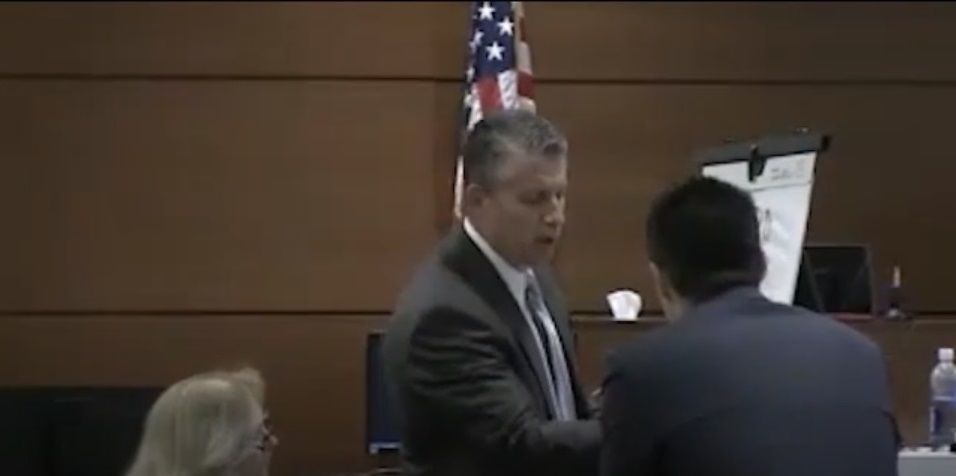

The Expert: Dr. George Azar, a pulmonologist in Florida, outlines respiratory disease and its general link with smoking.

Florida pulmonologist Dr. George Azar testifies in a 2018 Florida tobacco trial in which the plaintiff claimed the tobacco company concealed the dangers of smoking, which ultimately led to respiratory disease in the smoker at the center of the case. In this clip, the testifying expert discusses the types of respiratory diseases caused by smoking.
Opening the discussion with epidemiologic and statistical information about chronic obstructive pulmonary disease (COPD), Azar establishes that this is a common ailment with a significant mortality. It is classified into chronic bronchitis and emphysema. The former involves the airways, and the latter the lung tissue itself. In order to make the diagnosis, one must first have suspicion based upon the clinical presentation. These symptoms might include wheezing, cough, difficulty breathing, shortness of breath, and increase in bronchial secretions. If the clinical findings support this type of pathology, a definitive evaluation of Pulmonary Function Tests (PFTs) must be accomplished.
PFTs measure air flow within the lungs. By definition, there must be air flow limitation measured by PFTs in order to pin the diagnosis of COPD on a patient. This type of evaluation will establish the diagnosis, determine the severity of the disease, and allow the physician to follow the progress of the disease with treatment. In 85% of patients with COPD, the cause is smoking. Other causes would include air pollution, fumes, and exposure to certain environmental toxins.
The most common symptom of COPD is cough. This can produce phlegm or can be a non-productive, dry cough. The second most common symptom is shortness of breath, which may occur with exertion or at rest. Other symptoms not previously alluded to include coughing up blood, fatigue, and weight loss.
This, the expert notes, is a “progressive disease” and requires years to develop. It does not come on suddenly. Even people who do not smoke and have no obvious risk factors will naturally lose a small amount of functional lung tissue every year, but this does not generally lead to disability or symptoms. In smokers, that yearly deterioration is five times as much.
Using demonstrative aids, the doctor explains how breathing works. The exchange of oxygen and CO2 across the membrane of the air sacs of the lung occurs rapidly and efficiently in a healthy lung. With chronic bronchitis, the airways leading to the air sacs become obstructed with mucus, inflammation, debris, and swelling. Muscles in the wall of the bronchial tubes become larger, narrowing further the diameter of the bronchi and chronically worsening the obstruction. Chronic bronchitis is “an unrelenting problem,” generally lasting two or three months, for two or three years in a row.
Emphysema affects the “deepest part of the lung.” The bronchial airways will not be the primary part involved. Instead the air sacs, or alveoli, are destroyed with this pathophysiology.
The inflammation caused by the offending inhaled particle or fume is so severe that it leads to enzymatic destruction of the structure of those air sacs. Many air sacs coalesce into one large one that has much smaller surface area for gas exchange, making this function much less efficient.
These manifestations of COPD affect a patient’s chances of a successful surgical procedure. If the symptoms are not minimized preoperatively, there is a much higher chance of respiratory as well as surgical complications.
The expert very clearly and simply tied smoking to all types of COPD. The jury concurred, awarding $1 million.
Gary Gansar, MD, is residency-trained in general surgery. He served as Chief of Surgery and Staff at Elmwood Medical Center and on the Medical Executive Committee at Touro Infirmary and Mercy Hospital in New Orleans, LA. Dr. Gansar was Board Certified in general surgery while in active practice. He joined AMFS in 2015 as a Physician Medical Director.
The medical expert witness partner for attorneys serious about building a winning case
AMFS is your trusted source for highly-qualified medical expert witnesses. After pioneering the field nearly three decades ago, we’re continuing to redefine medical expert witness services by providing value far beyond a referral alone.
Our Physician Medical Directors know what it takes to build a strong case. Our medical expert witnesses leave no doubt. And our case managers streamline billing and logistics every step of the way, letting you focus on what you do best: constructing your winning case. Explore why AMFS clients expect more from their medical expert witnesses—and get it.
